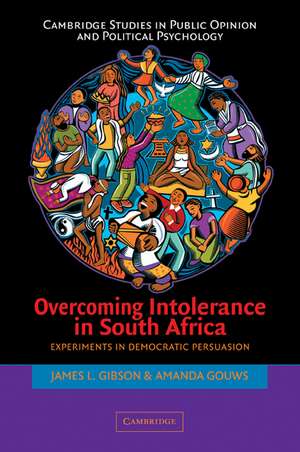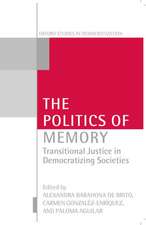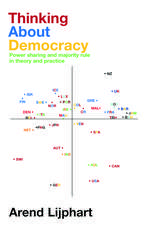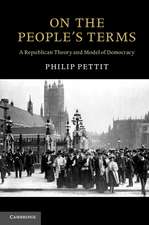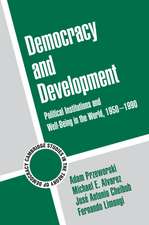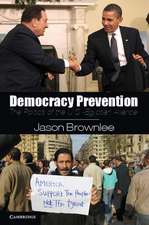Overcoming Intolerance in South Africa: Experiments in Democratic Persuasion: Cambridge Studies in Public Opinion and Political Psychology
Autor James L. Gibson, Amanda Gouwsen Limba Engleză Paperback – 6 noi 2005
| Toate formatele și edițiile | Preț | Express |
|---|---|---|
| Paperback (1) | 286.89 lei 6-8 săpt. | |
| Cambridge University Press – 6 noi 2005 | 286.89 lei 6-8 săpt. | |
| Hardback (1) | 696.45 lei 6-8 săpt. | |
| Cambridge University Press – 22 sep 2002 | 696.45 lei 6-8 săpt. |
Din seria Cambridge Studies in Public Opinion and Political Psychology
-
 Preț: 166.99 lei
Preț: 166.99 lei - 14%
 Preț: 694.64 lei
Preț: 694.64 lei -
 Preț: 227.65 lei
Preț: 227.65 lei -
 Preț: 205.84 lei
Preț: 205.84 lei -
 Preț: 267.95 lei
Preț: 267.95 lei -
 Preț: 268.38 lei
Preț: 268.38 lei -
 Preț: 364.26 lei
Preț: 364.26 lei -
 Preț: 223.29 lei
Preț: 223.29 lei -
 Preț: 223.29 lei
Preț: 223.29 lei -
 Preț: 227.45 lei
Preț: 227.45 lei -
 Preț: 226.46 lei
Preț: 226.46 lei -
 Preț: 287.28 lei
Preț: 287.28 lei -
 Preț: 288.25 lei
Preț: 288.25 lei -
 Preț: 263.00 lei
Preț: 263.00 lei -
 Preț: 229.56 lei
Preț: 229.56 lei -
 Preț: 287.87 lei
Preț: 287.87 lei - 11%
 Preț: 556.32 lei
Preț: 556.32 lei -
 Preț: 225.20 lei
Preț: 225.20 lei -
 Preț: 280.91 lei
Preț: 280.91 lei -
 Preț: 201.59 lei
Preț: 201.59 lei - 11%
 Preț: 573.26 lei
Preț: 573.26 lei -
 Preț: 271.98 lei
Preț: 271.98 lei -
 Preț: 285.75 lei
Preț: 285.75 lei - 11%
 Preț: 554.48 lei
Preț: 554.48 lei -
 Preț: 260.11 lei
Preț: 260.11 lei -
 Preț: 322.89 lei
Preț: 322.89 lei -
 Preț: 384.34 lei
Preț: 384.34 lei -
 Preț: 224.62 lei
Preț: 224.62 lei -
 Preț: 265.11 lei
Preț: 265.11 lei
Preț: 286.89 lei
Nou
Puncte Express: 430
Preț estimativ în valută:
54.90€ • 57.58$ • 45.70£
54.90€ • 57.58$ • 45.70£
Carte tipărită la comandă
Livrare economică 01-15 aprilie
Preluare comenzi: 021 569.72.76
Specificații
ISBN-13: 9780521675154
ISBN-10: 0521675154
Pagini: 280
Dimensiuni: 152 x 229 x 16 mm
Greutate: 0.43 kg
Editura: Cambridge University Press
Colecția Cambridge University Press
Seria Cambridge Studies in Public Opinion and Political Psychology
Locul publicării:New York, United States
ISBN-10: 0521675154
Pagini: 280
Dimensiuni: 152 x 229 x 16 mm
Greutate: 0.43 kg
Editura: Cambridge University Press
Colecția Cambridge University Press
Seria Cambridge Studies in Public Opinion and Political Psychology
Locul publicării:New York, United States
Cuprins
List of tables and figures; Preface; Part I. Introduction: 1. Political tolerance in the New South Africa; 2. The South African context; Part II. South African Intolerance as It Is: 3. The nature of political intolerance in South Africa; 4. Social identities, threat perceptions and political intolerance; 5. Making tolerance judgements: the effect of context, local and national; Part III. South African Intolerance as It Might Be: 6. The persuasibility of tolerance and intolerance; 7. The law and legal institutions as agents of persuasion; 8. Becoming tolerant? Short-term changes in South African political culture; 9. Conclusions: experimenting with tolerance in the New South Africa; Appendix: research design and methodology; References; Index.
Recenzii
'The irony of politics is that people may behave in an intolerant manner at a certain level, while being tolerant at another. Despite these complexities, the book successfully raises deep questions surrounding one of the prime qualities required of democratic culture. It ventures into new terrain in the context of South Africa, and it is bound to influence the mode of enquiry into this subject. It is a stimulating and thoughtful projection of how the post-apartheid South Africa looks and how it ought to be.' Politikon: South African Journal of Political Studies
'From time to time there are works that change how we ought to think about important problems. James L. Gibson and Amanda Gouws' Overcoming Intolerance in South Africa is such a work … This is an original and fundamental contribution. It opens up a deeper understanding of the dynamics of the politics of tolerance once you accept the proposition that it is easier to dislodge those whose first reaction is to support the rights of controversial groups than to dislodge those whose first reaction is to reject them … Still major leaps forward usually look awkward from some angle. And Gibson and Gouws' Overcoming Intolerance in South Africa is a major leap forward.' The Journal of Politics
'In Overcoming Intolerance in South Africa, Jim Gibson and Amanda Gouws have written what is, in at least one respect, a courageous book. It is courageous because it is in many ways pessimistic about the prospects for political tolerance (and therefore, they argue, for democratic consolidation) in post-apartheid South Africa … What I found instead was a creative, meticulous, and thoroughly honest depiction of the condition of mass political tolerance in South Africa, albeit one which paints a somewhat more dismal picture of the future than others might have it … While in its current form, Overcoming Intolerance may not satisfy some readers' desire for tales from places far away, its solid theoretical grounding, creative use of experimental designs in a survey context, and forthright (if a bit gloomy) conclusions are a model for research on acherontic outlook, the authors remain guardedly upbeat about the prospects for a tolerant, multiracial, democratic South Africa. One can but hope that their optimism is both warranted and realized.' Law and Politics Book Reviews
'Although tolerance has been studied extensively in the United States and in a handful of other settings, James Gibson and Amanda Gouws' study of tolerance within newly democratic South Africa offers unique insight into the roots of tolerance and its fragility.' Perspectives on Politics
'The authors are serious political scientists who produced a carefully designed and evaluated survey instrument and conducted their research with numerous checks and balances so as not to misinterpret their findings or manipulate their respondents. This is a very important book.' Mail & Guardian
'From time to time there are works that change how we ought to think about important problems. James L. Gibson and Amanda Gouws' Overcoming Intolerance in South Africa is such a work … This is an original and fundamental contribution. It opens up a deeper understanding of the dynamics of the politics of tolerance once you accept the proposition that it is easier to dislodge those whose first reaction is to support the rights of controversial groups than to dislodge those whose first reaction is to reject them … Still major leaps forward usually look awkward from some angle. And Gibson and Gouws' Overcoming Intolerance in South Africa is a major leap forward.' The Journal of Politics
'In Overcoming Intolerance in South Africa, Jim Gibson and Amanda Gouws have written what is, in at least one respect, a courageous book. It is courageous because it is in many ways pessimistic about the prospects for political tolerance (and therefore, they argue, for democratic consolidation) in post-apartheid South Africa … What I found instead was a creative, meticulous, and thoroughly honest depiction of the condition of mass political tolerance in South Africa, albeit one which paints a somewhat more dismal picture of the future than others might have it … While in its current form, Overcoming Intolerance may not satisfy some readers' desire for tales from places far away, its solid theoretical grounding, creative use of experimental designs in a survey context, and forthright (if a bit gloomy) conclusions are a model for research on acherontic outlook, the authors remain guardedly upbeat about the prospects for a tolerant, multiracial, democratic South Africa. One can but hope that their optimism is both warranted and realized.' Law and Politics Book Reviews
'Although tolerance has been studied extensively in the United States and in a handful of other settings, James Gibson and Amanda Gouws' study of tolerance within newly democratic South Africa offers unique insight into the roots of tolerance and its fragility.' Perspectives on Politics
'The authors are serious political scientists who produced a carefully designed and evaluated survey instrument and conducted their research with numerous checks and balances so as not to misinterpret their findings or manipulate their respondents. This is a very important book.' Mail & Guardian
Notă biografică
Descriere
This book investigates the degree to which political tolerance effects democratic reform in South Africa.
